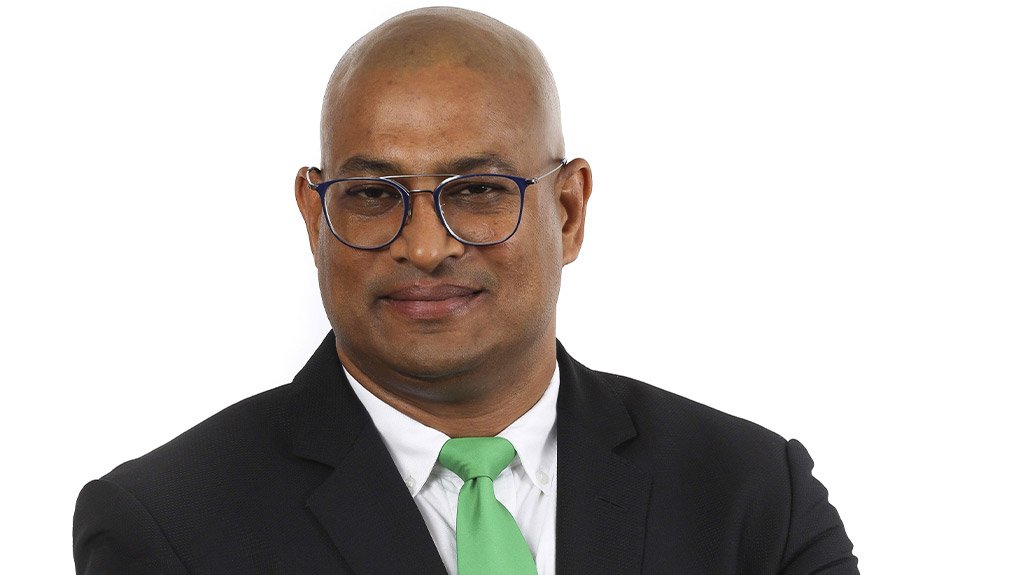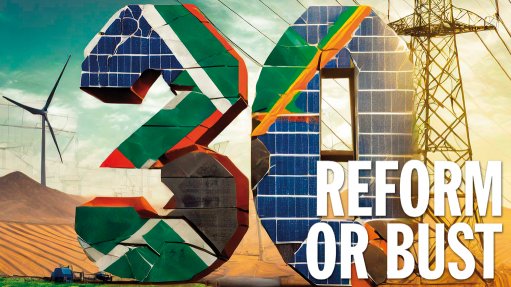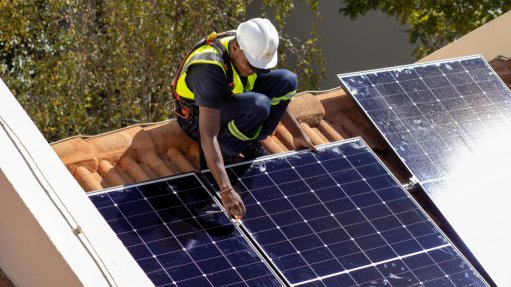The green economy – our place in history starts today
This article has been supplied by the author and has not been written or solicited by Creamer Media. It may be available only for a limited time on this website.
By Devan Pillay, Cluster President: Anglophone Africa at Schneider Electric
In a time when the planet is under tremendous pressure, facing the existential threat of complete environmental degradation, it's clear that company profits and strategies cannot exist in isolation. This dialogue becomes even more imperative when considering how sustainability initiatives impact the organisational bottom line.
Driving the move towards sustainability is the consumer; there is a growing consciousness perpetuated by realities such as power and water shortage and how one can contribute to the circular economy.
Consumers are readily adapting and becoming more mindful of when and how they consume the planet’s valuable resources. This shift in consumer behaviour also sets the tone for companies and their sustainability endeavours.
Sustainability is not an "either-or" scenario, it should be integrated within the very foundation of organisational processes and operations. Here, it’s important that when businesses examine their organisational processes, they do so with sustainable practices in mind.
Furthermore, embracing sustainability is not just an environmental concern; it encompasses various socio-economic elements like skills development, diversity and corporate governance. And again, corporate governance is not just an optional add-on, it forms a critical part of a company’s identity and brand.
Realising the greener economy
It’s also important to consider the scalability of sustainability initiatives. Many companies start with small kilowatt inverters, which offer room for expansion and growth. This is precisely what we advocate; lay the foundation and build on it.
The goal is to avoid a situation where you're forced to make a sudden, disruptive change. Instead, make progressive investments from the outset. This approach will benefit both the market and the customers you serve. .
The good news is there’s a growing demand for circular economy practices. For instance, at Schneider Electric we produce circuit breakers which are large, bulky items made of plastic and metal. We’ve had to take a step back and rethink our product design to enable reusability and component harvesting at the end of life. This commitment drives our R&D efforts throughout our various offerings which result in more sustainable product design and manufacturing.
Transitioning to a greener economy, particularly through the adoption of renewable energy sources, comes with its own set of challenges. The cost associated with renewables like green hydrogen, wind and solar can be prohibitive.
That said, collaboration amongst organisations is undoubtedly driving innovation, and green initiatives are certainly becoming more viable. Again, Schneider Electric and many of our peers are investing heavily in R&D to find cost-effective solutions that bolster the green economy.
Electricity 4.0
As an organisation, one of our core differentiators is the ability to- through our myriad of digital solutions - integrate components seamlessly, therefore providing a holistic approach to sustainability. Our digital solutions collect and provide essential information that assist organisations in making informed decision that will aid their sustainability endeavours.
It is also important to note that an important part of this journey is electrification. Whilst the traditional image of electricity generation is generally associated with polluting power plants, we focus on harnessing renewable energy from green energy sources. Our emphasis lies in utilising this energy effectively and efficiently, not only to stimulate economic growth but also to ensure accessibility for everyone.
It is also this approach that closely aligns with Industry 4.0 and which we aptly refer to as Electricity 4.0. Together with our partners across the world we are building a New Electric World that provides smart energy to homes, buildings, data centres, industries, infrastructure, and grids,
Electricity is the most efficient energy; it is also the best vector for decarbonisation. By 2040, the share of electricity in everything we do will double, reaching at least 40% of final energy consumption; six times more electricity will be generated from solar and wind.
It should also be noted that electrification and digitisation must go hand in hand, as one complements the other. Without both, navigating the challenges of Industry 4.0 will become increasingly challenging.
An evolving workforce
There is no doubt that education and training must adapt to meet the demands of a workforce that focuses on green initiatives. Here, we are seeing online learning and apprenticeship programmes stepping to the fore, providing important platforms for individuals to gain the necessary skills in this changing, greener economy.
At tertiary institutions we are also seeing a blending of disciplines. Mechanical engineers now work with electronics, and new curriculum pathways like Mechatronics bridge these fields, representing the integration of modern technology with traditional learning.
We also need to rethink how learning is structured, breaking it down into smaller, more flexible segments, moving away from the traditional one-size-fits-all approach. The evolving workforce and industry landscape present challenges, but it offers opportunities for growth and adaptability.
Ultimately, moving towards an economy that is driven by sustainable practices requires fulltime commitment by both organisations and individuals alike. Our planet’s resources are finite, however, through collaboration, innovation and commitment we can solidify our place in history.
Comments
Announcements
What's On
Subscribe to improve your user experience...
Option 1 (equivalent of R125 a month):
Receive a weekly copy of Creamer Media's Engineering News & Mining Weekly magazine
(print copy for those in South Africa and e-magazine for those outside of South Africa)
Receive daily email newsletters
Access to full search results
Access archive of magazine back copies
Access to Projects in Progress
Access to ONE Research Report of your choice in PDF format
Option 2 (equivalent of R375 a month):
All benefits from Option 1
PLUS
Access to Creamer Media's Research Channel Africa for ALL Research Reports, in PDF format, on various industrial and mining sectors
including Electricity; Water; Energy Transition; Hydrogen; Roads, Rail and Ports; Coal; Gold; Platinum; Battery Metals; etc.
Already a subscriber?
Forgotten your password?
Receive weekly copy of Creamer Media's Engineering News & Mining Weekly magazine (print copy for those in South Africa and e-magazine for those outside of South Africa)
➕
Recieve daily email newsletters
➕
Access to full search results
➕
Access archive of magazine back copies
➕
Access to Projects in Progress
➕
Access to ONE Research Report of your choice in PDF format
RESEARCH CHANNEL AFRICA
R4500 (equivalent of R375 a month)
SUBSCRIBEAll benefits from Option 1
➕
Access to Creamer Media's Research Channel Africa for ALL Research Reports on various industrial and mining sectors, in PDF format, including on:
Electricity
➕
Water
➕
Energy Transition
➕
Hydrogen
➕
Roads, Rail and Ports
➕
Coal
➕
Gold
➕
Platinum
➕
Battery Metals
➕
etc.
Receive all benefits from Option 1 or Option 2 delivered to numerous people at your company
➕
Multiple User names and Passwords for simultaneous log-ins
➕
Intranet integration access to all in your organisation





















